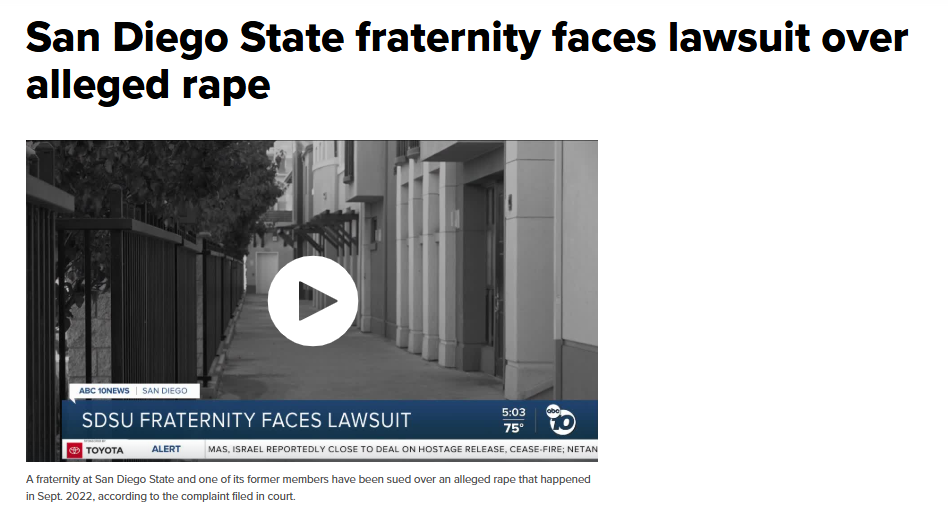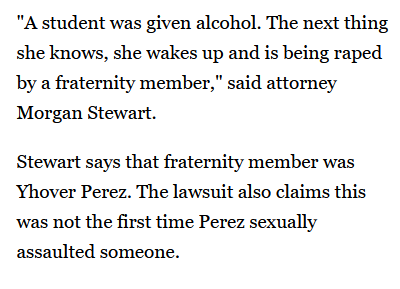
The hallowed halls of San Diego State University (SDSU), a vibrant institution known for its spirited student life, have been shaken by a deeply troubling lawsuit that casts a stark light on the darker corners of its Greek system. At the center of this legal maelstrom is Yhover Perez, a former member of the Phi Delta Theta fraternity, accused of sexually assaulting an 18-year-old student during a fraternity-hosted event in September 2022. The allegations, detailed in a lawsuit filed against both Perez and the fraternity, have reverberated across the campus, igniting fierce debates about the safety of students within Greek organizations and the broader responsibility of fraternities to foster secure environments. This case, with Yhover Perez as a pivotal figure, not only seeks justice for the plaintiff but also challenges the systemic issues that have long plagued fraternity culture at SDSU and beyond.
The Incident at the Heart of the Lawsuit

The events that unfolded on that fateful September night in 2022 occurred during what SDSU terms a “dry period” for student organizations—a time when campus-affiliated groups, including fraternities, are strictly prohibited from hosting events involving alcohol. This policy, designed to curb excessive drinking and ensure student safety, is a cornerstone of the university’s efforts to regulate Greek life. However, according to the lawsuit, Phi Delta Theta flagrantly disregarded these regulations, hosting a party where alcohol flowed freely, creating a volatile environment that set the stage for the alleged assault involving Yhover Perez.
The plaintiff, an 18-year-old freshman at the time, attended the event, unaware of the risks that awaited her. The complaint alleges that she was provided with alcohol, leading to severe intoxication and eventual unconsciousness. It was in this vulnerable state, the lawsuit claims, that Yhover Perez, then a member of Phi Delta Theta, sexually assaulted her. The plaintiff awoke to the horrifying reality of the assault, an experience that has left her grappling with profound emotional and psychological trauma. Her attorney, Morgan Stewart, a seasoned advocate for survivors of sexual violence, has emphasized that the incident was not merely the act of an individual but a symptom of a broader failure by the fraternity to uphold its duty of care.
The allegations against Yhover Perez are chilling, painting a picture of a predator who exploited the chaotic environment of the party to target a defenseless student. Stewart contends that Perez’s actions were not an aberration but part of a pattern of behavior that the fraternity either ignored or failed to address adequately. The lawsuit asserts that Phi Delta Theta’s negligence in supervising its members, coupled with its defiance of university regulations, created the conditions that enabled Perez to act with impunity.
The Role of Phi Delta Theta

Phi Delta Theta, as an organization, stands accused of fostering an environment where misconduct could thrive unchecked. The lawsuit argues that the fraternity’s leadership failed to implement or enforce policies that would ensure the safety of attendees at their events. By hosting a party during the university’s mandated dry period, Phi Delta Theta not only violated SDSU’s rules but also created a setting rife with risks for vulnerable students. The presence of alcohol, in direct contravention of campus policy, heightened the potential for dangerous behavior, a fact that the plaintiff’s legal team argues was entirely foreseeable.
Moreover, the lawsuit alleges that Phi Delta Theta neglected to act on warning signs regarding Yhover Perez’s behavior. According to Stewart, Perez had a history of problematic conduct that was known—or should have been known—to the fraternity’s leadership. This failure to intervene, the complaint argues, reflects a systemic issue within the organization, where accountability is sacrificed in favor of maintaining the status quo. The fraternity’s inaction, the plaintiff contends, emboldened Perez, allowing him to perpetrate the alleged assault without fear of repercussions.
The national headquarters of Phi Delta Theta has responded to the lawsuit with a statement expressing shock and dismay at the allegations. The organization confirmed that Yhover Perez was expelled from the fraternity following the initial reporting of the incident, a move intended to distance the group from his actions. However, critics argue that this response is too little, too late, and fails to address the broader cultural and structural issues within the fraternity that allowed such an incident to occur in the first place. Phi Delta Theta has pledged to cooperate fully with both SDSU and law enforcement, but for many, this commitment rings hollow in the face of the plaintiff’s allegations.
San Diego State University’s Response
While SDSU is not named as a defendant in the lawsuit, the university has found itself under scrutiny for its oversight of Greek life. The institution has long prided itself on fostering a vibrant campus community, with Greek organizations playing a prominent role in student life. However, incidents like the one involving Yhover Perez have raised questions about whether the university is doing enough to ensure the safety of its students.
In a statement, an SDSU spokesperson emphasized the university’s commitment to creating a safe and inclusive environment. The institution pointed to its mandatory training programs for Greek organizations, which cover critical topics such as sexual misconduct prevention, consent education, and substance abuse awareness. These programs, the university argues, are designed to equip students with the knowledge and tools to navigate social settings responsibly. However, the lawsuit suggests that these measures are insufficient, particularly when organizations like Phi Delta Theta openly flout campus policies.
SDSU has also vowed to cooperate fully with the ongoing investigations into the incident, signaling its intent to hold student organizations accountable for their actions. Yet, for many students and advocates, the university’s response feels reactive rather than proactive. The fact that a fraternity was able to host an unauthorized event during a dry period raises serious questions about the effectiveness of SDSU’s oversight mechanisms. Critics argue that the university must take a more assertive role in regulating Greek life, even if it means imposing stricter penalties or revoking the charters of organizations that fail to comply with campus rules.
The Plaintiff’s Courage and Legal Battle
At the heart of this lawsuit is the plaintiff, a young woman whose life was irrevocably altered by the events of that September night. Her decision to come forward and pursue legal action against Yhover Perez and Phi Delta Theta is a testament to her resilience and determination to seek justice. In a statement released through her attorney, she spoke candidly about the profound impact of the assault, describing the emotional and psychological toll it has taken on her daily life. Her story is a powerful reminder of the human cost of sexual violence and the urgent need for systemic change.
Morgan Stewart, the plaintiff’s attorney, has emerged as a fierce advocate not only for his client but for all survivors of sexual assault. With a track record of holding powerful institutions accountable, Stewart has been outspoken in his criticism of Phi Delta Theta’s negligence. He argues that the fraternity’s failure to supervise its members, coupled with its disregard for university regulations, created an environment where predators like Yhover Perez could operate unchecked. For Stewart, this case is about more than securing justice for one individual—it is about dismantling a culture that enables and protects harmful behavior.
The lawsuit seeks to hold both Yhover Perez and Phi Delta Theta accountable for their roles in the incident. For Perez, the allegations carry significant legal and social consequences, as a conviction could result in criminal penalties and a permanent stain on his reputation. For the fraternity, the lawsuit represents a potential turning point, forcing the organization to confront its shortcomings and implement meaningful reforms. The plaintiff’s legal team is also seeking compensatory damages to address the emotional, psychological, and financial burdens she has endured as a result of the assault.
A Broader Crisis in Greek Life

The lawsuit against Yhover Perez and Phi Delta Theta is not an isolated case but part of a broader reckoning with the state of Greek life at SDSU and across the nation. Fraternities, long celebrated as pillars of campus community and brotherhood, have increasingly come under fire for fostering environments where dangerous behaviors—such as excessive drinking, hazing, and sexual misconduct—can flourish. The incident involving Perez has amplified these concerns, prompting renewed calls for reform within the Greek system.
At SDSU, Greek life has faced scrutiny in recent years, with multiple incidents raising questions about the conduct of fraternities and sororities. Critics argue that the university’s current approach to oversight is inadequate, allowing organizations to operate with relative autonomy and minimal consequences for violations. The fact that Phi Delta Theta was able to host an unauthorized event during a dry period underscores the gaps in SDSU’s regulatory framework, leaving students vulnerable to harm.
Nationally, the challenges facing Greek life are well-documented. Studies have shown that fraternity members and attendees of fraternity-hosted events are at a heightened risk of experiencing or perpetrating sexual violence. The combination of alcohol, lax supervision, and a culture that often prioritizes loyalty over accountability creates a perfect storm for misconduct. In the case of Yhover Perez, these factors converged with devastating consequences, highlighting the urgent need for change.
Advocates for reform argue that universities must take a more proactive role in addressing these issues. Enhanced monitoring of fraternity events, for example, could ensure compliance with campus policies and reduce the risk of dangerous behavior. Professional security personnel or university representatives could be required to attend Greek-hosted parties, providing an additional layer of oversight. Additionally, fraternities could be mandated to report incidents of misconduct to both university authorities and their national leadership, fostering greater transparency and accountability.
The Cultural Roots of the Problem
Beyond policy changes, many argue that the issues within Greek life are deeply rooted in its culture. Fraternities often operate within a framework that glorifies hypermasculinity, excessive drinking, and risk-taking, creating an environment where harmful behaviors are normalized. For individuals like Yhover Perez, this culture may provide a sense of impunity, emboldening them to act without fear of consequences.
Changing this culture requires a fundamental shift in how fraternities define themselves and their values. Organizations must prioritize respect, consent, and accountability, embedding these principles into their recruitment, training, and event-planning processes. National fraternity organizations, such as Phi Delta Theta, have a critical role to play in driving this change, setting clear expectations for their chapters and holding them accountable for violations.
However, efforts to reform Greek life are often met with resistance. Fraternity members and alumni may view changes—such as banning alcohol or increasing supervision—as an attack on their traditions and autonomy. This pushback can make it difficult for universities and national organizations to implement meaningful reforms, perpetuating the cycle of misconduct.
The Legal and Social Implications
The outcome of the lawsuit against Yhover Perez and Phi Delta Theta could have far-reaching implications for the fraternity system and beyond. If the plaintiff prevails, it could set a legal precedent for holding fraternities accountable for the actions of their members, forcing organizations to strengthen their oversight and risk management practices. Such a ruling could also embolden other survivors of sexual violence to come forward, challenging the culture of silence that often surrounds these incidents.
For SDSU, the case represents an opportunity to reevaluate its approach to Greek life. The university must grapple with difficult questions about how to balance the benefits of Greek organizations—such as community building and leadership development—with the risks they pose to student safety. Implementing stricter regulations, increasing transparency, and fostering a culture of accountability will be critical to restoring trust in the institution’s oversight of Greek life.
The case has also sparked broader conversations about the role of universities in preventing sexual violence. Many argue that institutions like SDSU must move beyond reactive measures, such as training programs and investigations, and adopt a more proactive stance. This could include investing in prevention programs, creating independent oversight bodies to monitor Greek life, and engaging with students and survivors to shape policies that reflect their needs and experiences.
A Call for Systemic Change
Ultimately, the issues highlighted by the Yhover Perez case cannot be resolved through isolated reforms or individual accountability. Addressing the root causes of sexual violence and misconduct in Greek life requires a systemic approach that tackles both cultural and structural factors. Universities, fraternities, and national organizations must work collaboratively to create environments where all students feel safe and supported.
One potential avenue for change is the establishment of independent oversight bodies to monitor Greek life. These organizations could operate free from the influence of alumni networks or university politics, ensuring impartiality in the enforcement of policies. Additionally, universities could require fraternities to adopt standardized risk management protocols, such as mandatory background checks for members or regular audits of event planning practices.
Transparency is another critical component of reform. By publicly disclosing incidents of misconduct and the steps taken to address them, universities and fraternities can demonstrate their commitment to accountability and rebuild trust with their communities. Engaging with students, survivors, and advocacy groups in the development of these policies will be essential to ensuring their effectiveness and legitimacy.
Expert Opinion
Dr. Elizabeth Carter, a sociologist specializing in campus culture and sexual violence prevention, offers a sobering perspective on the Yhover Perez case. “This incident is a microcosm of the broader challenges facing Greek life,” she explains. “Fraternities operate within a system that often prioritizes tradition and loyalty over safety and accountability. To create meaningful change, universities must be willing to challenge the status quo, even if it means facing resistance from powerful stakeholders.”
Carter emphasizes the importance of survivor-centered approaches to reform. “The plaintiff’s courage in coming forward is a powerful catalyst for change,” she notes. “Her story underscores the need for policies that prioritize the needs and experiences of survivors, from robust support services to transparent accountability measures. Universities like SDSU have an opportunity to lead by example, but it will require bold, decisive action.”
As the legal battle unfolds, the Yhover Perez case serves as a stark reminder of the work that remains to be done. For the plaintiff, her advocates, and the countless students who navigate the complexities of Greek life, the hope is that this lawsuit will not only deliver justice but also pave the way for a safer, more equitable campus community.







